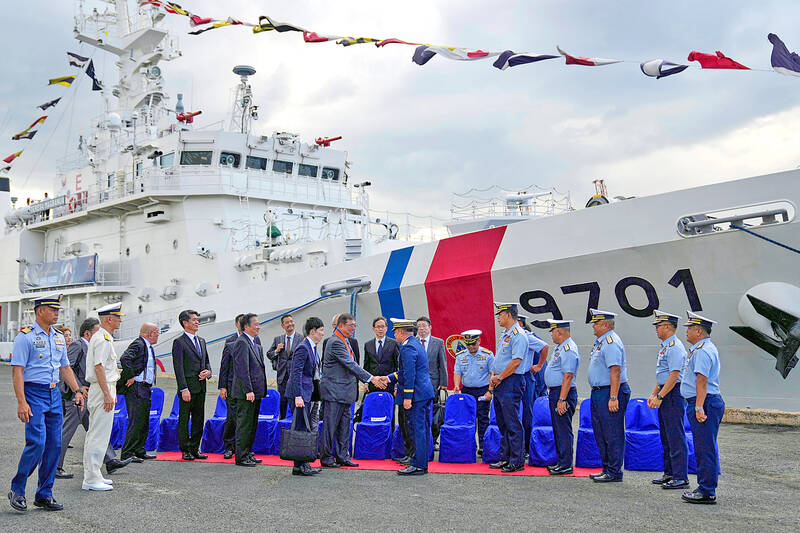China has removed its last buoy from Japanese economic waters, a Japan Coast Guard spokesman said yesterday, in what might be a move by Beijing to improve ties.
Japan in December last year said that it had spotted a new buoy in its exclusive economic zone south of Yonaguni Island, near Taiwan, and demanded that China remove it immediately.
The Japan Coast Guard issued a statement late on Wednesday saying that the buoy was no longer in place.

Photo: AP
A spokesman yesterday told reporters that it means all Chinese buoys in Japanese economic waters have been removed.
Japanese media said this could signal an intention by Beijing to improve ties with Tokyo, as China faces political and economic pressure from US President Donald Trump’s government.
“I decline to speculate on China’s intentions,” Japanese Chief Cabinet Secretary Yoshimasa Hayashi told reporters when asked about the removal of the buoy.
Beijing had in July 2023 installed another buoy within the nation’s exclusive economic zone — near the Diaoyutais (釣魚台), a group of islets that Japan controls and calls the Senkakus, but are also claimed by Taiwan and China.
In February, China moved that buoy out of Japan’s zone, the coast guard spokesman said.
Separately, The Philippine Ministry of Foreign Affairs yesterday said that China has no right to object to or interfere with its lawful and routine activities in the South China Sea.
The ministry said that it also “rejects and refutes” statements by the Chinese embassy in Manila that Beijing has indisputable sovereignty over the Spratly Islands (Nansha Islands, 南沙群島).
Taiwan, the Philippines, Malaysia, Vietnam and China between them have claims and a presence on dozens of features in the Spratly archipelago, ranging from reefs and rocks to islands, natural and artificial.
“We urge China to respect the Philippines’ sovereignty and jurisdiction, even as we continue to pursue peaceful and legal means to manage differences and the situation at sea,” ministry spokeswoman Teresita Daza said in a statement.
“The Philippines is clearly within its rights to conduct routine maritime operations and scientific research in and around these features, and will continue to do so,” Daza said.
“China has no right to object much less interfere with these lawful and routine activities,” she added.
Additional reporting by Reuters

Right-wing political scientist Laura Fernandez on Sunday won Costa Rica’s presidential election by a landslide, after promising to crack down on rising violence linked to the cocaine trade. Fernandez’s nearest rival, economist Alvaro Ramos, conceded defeat as results showed the ruling party far exceeding the threshold of 40 percent needed to avoid a runoff. With 94 percent of polling stations counted, the political heir of outgoing Costa Rican President Rodrigo Chaves had captured 48.3 percent of the vote compared with Ramos’ 33.4 percent, the Supreme Electoral Tribunal said. As soon as the first results were announced, members of Fernandez’s Sovereign People’s Party

MORE RESPONSIBILITY: Draftees would be expected to fight alongside professional soldiers, likely requiring the transformation of some training brigades into combat units The armed forces are to start incorporating new conscripts into combined arms brigades this year to enhance combat readiness, the Executive Yuan’s latest policy report said. The new policy would affect Taiwanese men entering the military for their compulsory service, which was extended to one year under reforms by then-president Tsai Ing-wen (蔡英文) in 2022. The conscripts would be trained to operate machine guns, uncrewed aerial vehicles, anti-tank guided missile launchers and Stinger air defense systems, the report said, adding that the basic training would be lengthened to eight weeks. After basic training, conscripts would be sorted into infantry battalions that would take

GROWING AMBITIONS: The scale and tempo of the operations show that the Strait has become the core theater for China to expand its security interests, the report said Chinese military aircraft incursions around Taiwan have surged nearly 15-fold over the past five years, according to a report released yesterday by the Democratic Progressive Party’s (DPP) Department of China Affairs. Sorties in the Taiwan Strait were previously irregular, totaling 380 in 2020, but have since evolved into routine operations, the report showed. “This demonstrates that the Taiwan Strait has become both the starting point and testing ground for Beijing’s expansionist ambitions,” it said. Driven by military expansionism, China is systematically pursuing actions aimed at altering the regional “status quo,” the department said, adding that Taiwan represents the most critical link in China’s

EMERGING FIELDS: The Chinese president said that the two countries would explore cooperation in green technology, the digital economy and artificial intelligence Chinese President Xi Jinping (習近平) yesterday called for an “equal and orderly multipolar world” in the face of “unilateral bullying,” in an apparent jab at the US. Xi was speaking during talks in Beijing with Uruguayan President Yamandu Orsi, the first South American leader to visit China since US special forces captured then-Venezuelan president Nicolas Maduro last month — an operation that Beijing condemned as a violation of sovereignty. Orsi follows a slew of leaders to have visited China seeking to boost ties with the world’s second-largest economy to hedge against US President Donald Trump’s increasingly unpredictable administration. “The international situation is fraught